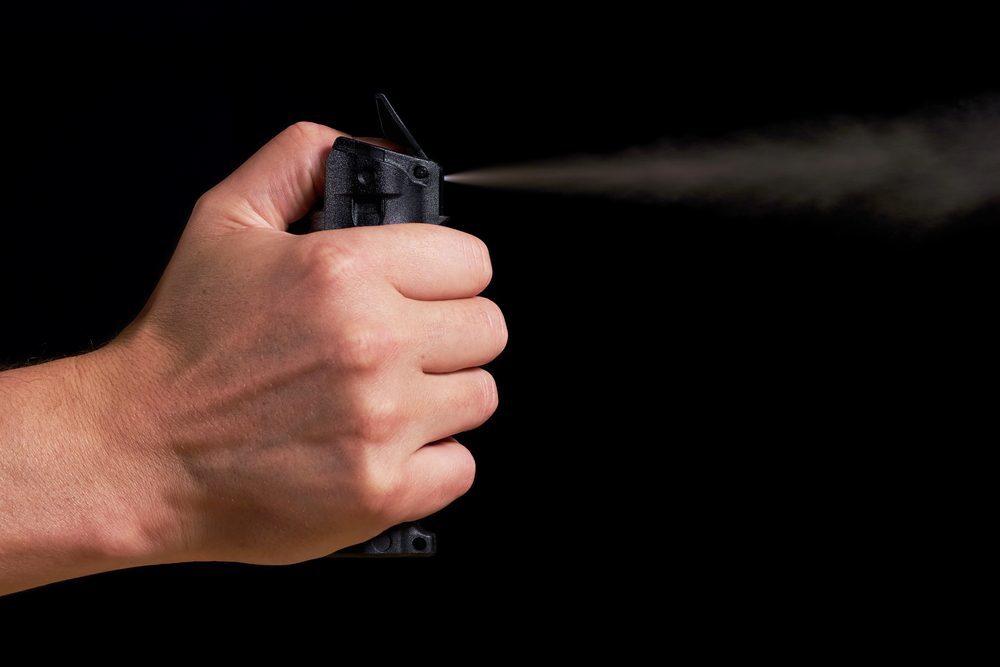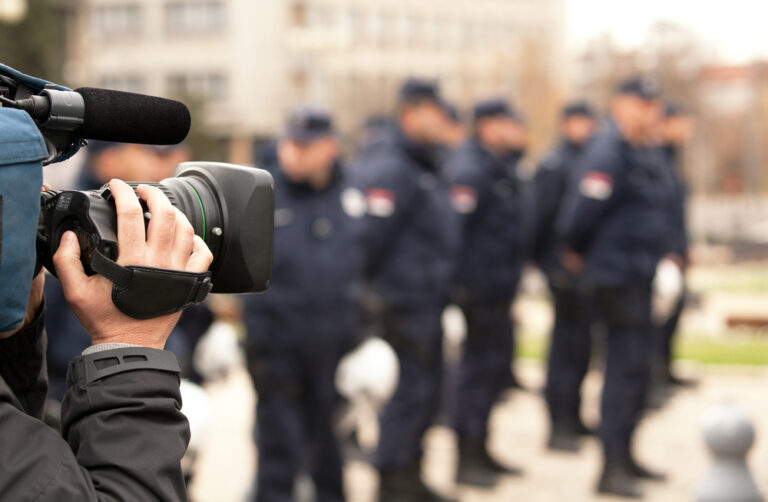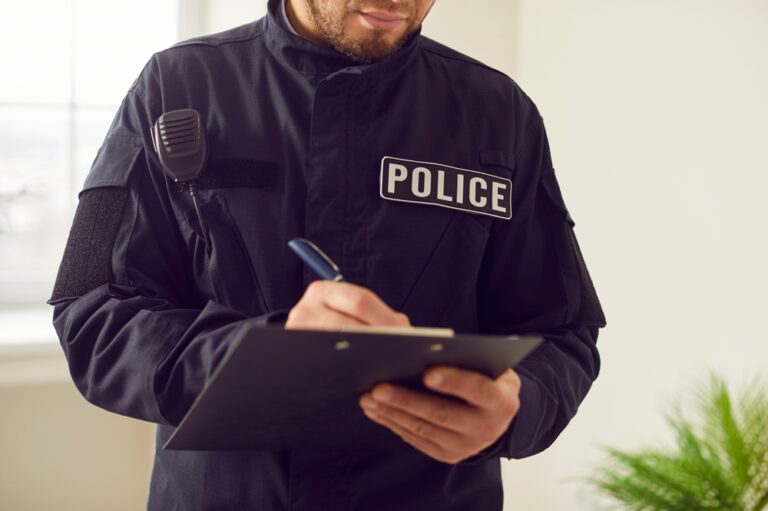
Police Tape 101: Everything You Need to Know
Police tape, commonly known as crime scene tape, is an important tool used by law enforcement to secure…

Pepper spray is a popular self-defense tool that has been used for decades. It is widely available, relatively inexpensive, and effective at disabling attackers. But have you ever wondered how pepper spray works?
In this article, we’ll dive deep into the science behind pepper spray and its effects on the human body. From the moment it hits the skin, to the respiratory system’s response, to the brain’s reaction, we’ll explore every step of the process.
Understanding the mechanics of pepper spray can help you make informed decisions regarding self-defense and your own safety in dangerous situations.
That being said, let’s take a closer look at what happens when someone is exposed to pepper spray.
When someone is exposed to pepper spray, the active ingredient, capsaicin, irritates the mucous membranes of the eyes, nose, throat, and lungs. This can lead to immediate and intense symptoms, including tearing, redness, swelling, coughing, choking, and shortness of breath. The severity of the symptoms depends on the strength of the pepper spray, the duration of exposure, and the individual’s sensitivity.
In addition to the physical effects, exposure to pepper spray can also cause psychological distress, such as anxiety, fear, and panic. People who have been exposed to pepper spray may experience a sense of disorientation and confusion, which can make it difficult to respond appropriately to the situation.
It is important to seek medical attention if someone experiences severe or prolonged symptoms after being exposed to pepper spray. In some cases, pepper spray exposure can lead to more serious health complications, such as respiratory distress or chemical burns.
Pepper spray has an instantaneous effect on a person’s eyes, causing intense irritation, neurogenic inflammation, and temporary blindness. There might also be adverse side effects such as throat irritation, acute corneal abrasion, sneezing, and shortness of breath. While there is no definite evidence that pepper spray causes lasting eye injuries, repeated exposure with direct contact might cause chronic corneal damage. Injuries like corneal erosion might result in vision loss or blindness. It is essential to consult a medical doctor immediately if you experience these symptoms.
Read more about how pepper spray can damage eyes in our article.
If you’re exposed to pepper spray, try to blink and avoid touching your face. Wash your eyes with cold water and clean other affected areas with soap. Change clothes to prevent further contact.
For more information on how to properly remove pepper spray from your eyes and skin, please refer to our article.
If you get pepper spray on your skin, avoid contact with other areas of your body. Wash the exposed area with cold water and dish soap, followed by a saline solution. You can also try applying olive or vegetable oil to the affected areas and wiping it off with a clean towel. If these methods don’t work, consider using medicated wipes. For a more detailed guide, check out our longer article on how to get pepper spray off your skin.
Pepper spray is generally considered to be an effective self-defense tool. The active ingredient in pepper spray, oleoresin capsicum (OC), causes significant irritation to the eyes, nose, and throat, making it difficult for an attacker to continue their aggression. Studies have shown that pepper spray is effective in over 90% of cases when used properly, and it can incapacitate an attacker for up to 30 minutes, allowing the user to escape and seek help. However, it’s important to note that pepper spray is not a guarantee of safety and should always be used in conjunction with other self-defense techniques and strategies.
While many people mistakenly believe that it’s possible to build up an immunity to the effects of pepper spray, this is simply not true. Even with repeated exposure, pepper spray will continue to be an effective deterrent with the ability to incapacitate. In fact, the capsaicin in pepper spray is designed to affect even those with a high pain tolerance, making it even more effective.
It’s important to note that some people may mistakenly believe that they are immune to pepper spray because they are immune to CS gas, another chemical irritant used by law enforcement. However, only about 5% of the world’s population is immune to CS gas, and this immunity does not apply to pepper spray.
The effects of pepper spray exposure typically last for up to 30 minutes but people with pre-existing lung conditions may experience coughing and shortness of breath for longer. Ocular vision usually reverts to normal quickly, while erythema and photophobia may require medical attention.
It is highly unlikely to die from pepper spray exposure alone. However, in rare cases, pepper spray can cause respiratory distress, which may exacerbate underlying medical conditions that could then lead to death. According to a study published in the Western Journal of Medicine, individuals with pre-existing medical conditions, such as asthma or heart disease, are at an increased risk of severe respiratory distress and possibly even death following pepper spray exposure.
In another study published in the Journal of Forensic and Legal Medicine, a case report of an individual with asthma who died following pepper spray exposure was presented. The individual experienced severe respiratory distress, including coughing, wheezing, and shortness of breath, which ultimately led to his death.
It’s important to note that the use of pepper spray is generally considered safe when used appropriately and in accordance with instructions. However, it’s important to be aware of the potential risks and use caution when handling and using pepper spray.
If used improperly, pepper spray can cause serious harm, including blindness. The active ingredient capsaicin usually causes inflammation of the eyes, making it difficult to see. However, studies have shown that exposure to pepper spray can cause temporary blindness, which may last anywhere from 15 minutes to an hour.
In rare cases, pepper spray exposure can cause permanent eye damage, resulting in partial or total blindness. A study published in the Journal of Forensic and Legal Medicine found that exposure to pepper spray can cause corneal abrasions and scarring, which can lead to permanent vision impairment. However, it’s worth noting that the risk of permanent eye damage from pepper spray is relatively low and most people who are exposed to it will fully recover within a few days.
Milk can help alleviate the effects of pepper spray to some extent, as the fat in milk can counteract the effects of the capsaicin. However, milk is not a definite solution for pepper spray exposure and it may not work for everyone. It is still recommended to flush the affected area with water and seek medical attention if necessary. It is also important to note that milk is not recommended for use in the eyes, as it can cause additional irritation and may even increase the risk of infection. Therefore, while milk may provide some relief, it should not be considered a substitute for proper treatment.
If you think you may get into a situation resulting in pepper spray exposure, it’s essential that you have appropriate protective gear to protect your eyes and face, such as goggles or a face shield. If you don’t have anything to protect your eyes, you should close your eyes and turn your head away from the spray. It’s also important to have a plan of action in case you get sprayed, such as identifying a nearby water source to flush your eyes and skin. It’s crucial that you understand the effects and treatment options of pepper spray before entering a situation that may lead to exposure.
Pepper spray usually takes effect within seconds but the time may vary depending on the individual’s sensitivity or the concentration of the spray. Other factors also weigh in, such as the use of protective goggles or headwear. In some cases, the effects of the spray can be delayed for several minutes, allowing an attacker to continue their advance. The effects can also vary depending on the person’s physical condition, such as respiratory or cardiovascular wellness. It is always recommended to use pepper spray responsibly and in accordance with the manufacturer’s instructions.
Pepper spray is designed to cause temporary discomfort and incapacitate an attacker. While there are no specific studies regarding the use of pepper spray on individuals under the influence of alcohol or drugs, it’s important to note that the effects of the spray can be more severe and unpredictable on those individuals.
In general, intoxicated individuals may have a slower response time to the effects of the spray and their reactions may be less predictable. This can increase the risk of injury to both the individual and the person deploying the spray. Therefore, it’s recommended that you avoid using pepper spray on people who are visibly intoxicated or under the influence of drugs.
It is not recommended that pepper spray be used against pregnant women. This is because it may have adverse effects on both the mother and the unborn child. The active ingredient can cause breathing difficulties, chest pain, and excessive coughing. These symptoms can be especially dangerous for pregnant women, as they can lead to fetal distress and even premature birth.
To protect your eyes against injury and irritation, bring cleaning items like a fresh towel, water, baby shampoo, and chemical eyewash products. It’s also recommended to wear eye protection gear and avoid wearing contact lenses.

Police tape, commonly known as crime scene tape, is an important tool used by law enforcement to secure…

The police are called daily regarding various incidents of public interest. It is our responsibility to provide the…

Many police officers experience terrible, traumatic events in the line of duty. A significant number of police officers…